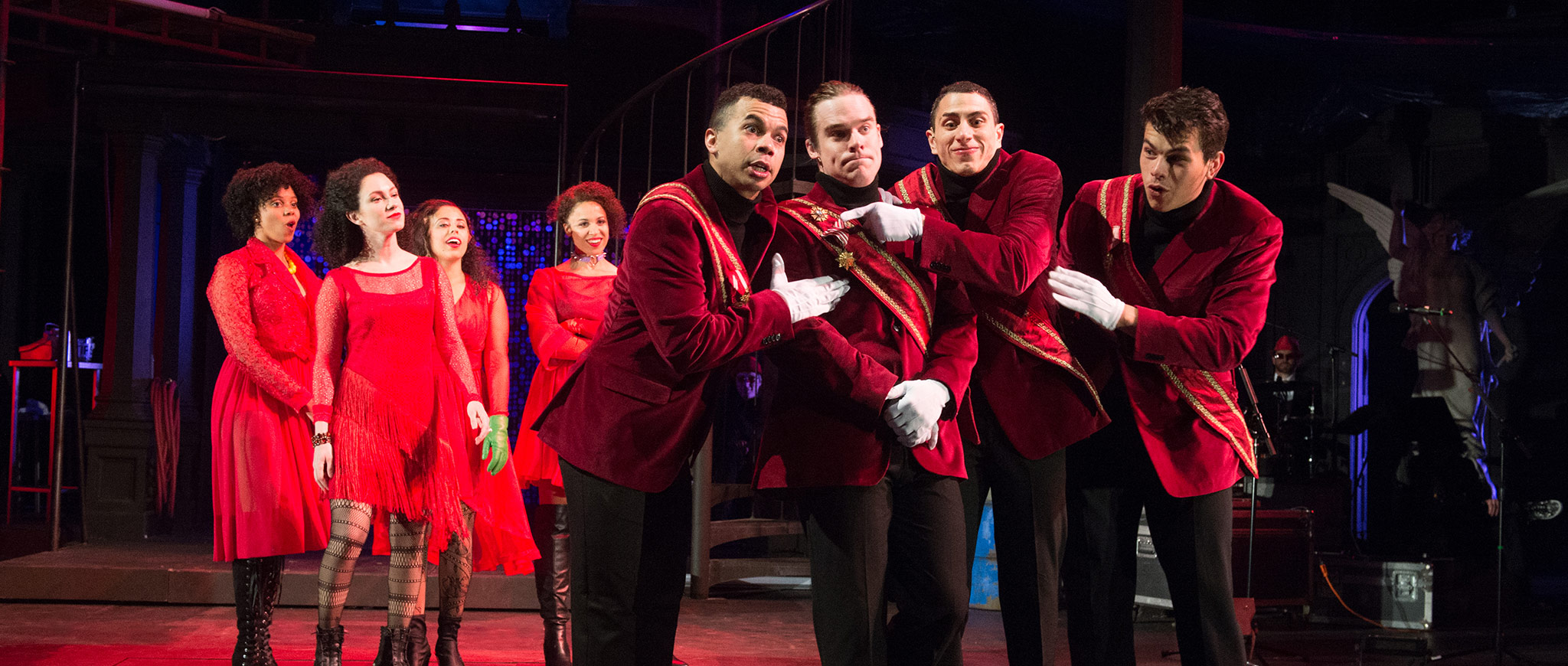 |
| OSF photo by Jenny Graham |
The Play
This is an extremely silly play, even by the standards of Shakespearean comedies. The premise at the outset is a bit bizarre, with King Ferdinand swearing an oath with his three students (Longaville, Dumain, and Berowne) that in order to keep focus on their studies, none of the three will have any contact with women for three years. And it's clear from the outset that none of them actually wants or expects to keep this vow. But there you are.So naturally, before even a day has passed, an emissary comes from the King of France: his daughter, the Princess. Ferdinand has to receive her, so the guys come up with ways to technically keep their vows while still receiving the Princess (and coincidentally, her three attendants: Rosaline, Maria, and Katharine).
There ensues a lot of silliness, accompanied by a lot of clever wordplay. Some plots that involve disguises and swapped identities (because it's a Shakespearean comedy). A few extra clownish characters thrown in for good measure, and you pretty much have "LLL".
It really is fun, kind of like cotton candy for the theater. It's Shakespeare having fun, playing with the language and with some of the tropes he will reuse later in some of his other comedies. But this is one of his earlier comedies, so we get to see him trying things out.
Unlike the canonical Shakespearean comedy, this does not end with weddings for all. One suspects that probably came at the end of the companion piece, Love's Labor's Won, that is now entirely lost to us. We get a pretty happy ending, just not the mass wedding we all expect.
The Production
I suppose it's appropriate that for an early, experimental work, the staging can include some pretty wacky stuff, too. Visually, this is a really impressive show: lots of color, a band onstage that various characters join in with at times, and paint. For reasons not entirely clear to me, characters spend a lot of time slapping themselves and others with brightly-colored paints.Several of the lead characters really stand out. Alejandra Escalante as the Princess of France is remarkably funny in an understated way. I'm accustomed to seeing her in dramatic roles, so it's kind of a nice change. Stephen Michael Spencer is clever and clownish as Berowne, and Jennie Greenberry as Rosaline manages to keep a relatively low profile until she starts singing with the band, because she has such an awesome voice. And William Thomas Hodgson redeems himself from his role in Romeo as a perfectly fine, funny Dumain (adding further evidence that R&J was hamstrung by direction, not performance).
I left out some entire plot lines from the description above, mostly because they don't add much to the play. Indeed, I would have been fine had they removed the whole portion with Holofernes and Sir Nathaniel and the pageant of the Nine Worthies. That was the only part of the show that really dragged for me, and it doesn't really contribute to any of the other plot lines.
Bottom Line
This play truly is a lot of sound and fury, much ado, and all that. Really not much here.And yet, it's really fun. It's amusing to listen, the presentation was fun to watch, colorful, musical, and entertaining. If I tried really hard, I might come up with some kind of lesson I supposedly learned, or some moral lesson that was ultimately upheld. But really, I just sat back and had a good time.
I liked it. I can't really explain that, but it was fun. And I suppose sometimes, that's enough.
No comments:
Post a Comment